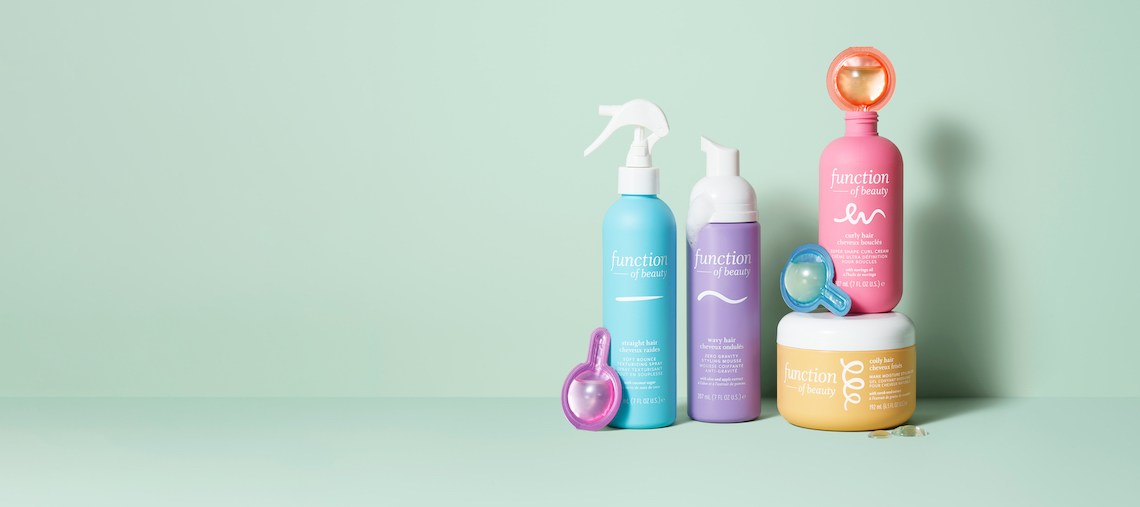Function of Beauty is deepening its relationship with Target by launching four customizable styling products exclusively available at the big box retailer.
The four new styling products include a texturizing spray for straight hair, a styling mousse for wavy hair, a shaping curl cream for curly hair and a styling gel for coily hair. Each item can be further customized with up to three booster packets out of 10 options based on their desired end result, such as shiny or voluminous hair. The brand uses the same concept for its shampoo and conditioners, which have been available in Target stores since Dec. 2020. This launch marks Function of Beauty’s first foray into customized styling in the brick-and-mortar space, though it released a DTC e-commerce styling primer in Oct. 2022.
“Styling is a category where people have multiple expectations regarding benefits. So, it is a perfect segue to offer them customization in this category, as well,” said Marianna Trofimova, CMO of Function of Beauty. “Styling is one of the most complex segmentations of all.”
Trofimova said styling products are difficult to navigate because there are different products for varying hair textures, followed by different levels of flexibility and hold, and other hair goals like volume and shine. Furthermore, customers also want more from their styling products in terms of clean ingredients and additional hair care benefits.
Trofimova declined to share overall Function of Beauty sales or growth. The 8-year-old brand raised a $150 million Series B led by L Catterton in 2020 and reportedly sought a $1 billion valuation. Function of Beauty will work with Target to promote the new products across social media, particularly with influencers on TikTok and Instagram. Target declined to comment for this story.
Function of Beauty’s further expansion to styling products, coupled with its focus on brick-and-mortar through its exclusive retail partner, speaks to both the evolution of customized products and Target’s own interest in customizable categories. Function of Beauty’s main competitor, Prose, currently offers a curl cream, a dry shampoo and a styling gel, but it has yet to expand to brick-and-mortar.
Underlying the drive for customized products is a changing customer demographic. As Glossy has previously reported, more than 50% of Gen Zers are non-white, and 75% of them define themselves as having textured hair. Existing products are unlikely to address future hair needs and desires of customers when those products are based on an outdated understanding of modern hair. This represents an opportunity for the customization market, which can more easily keep up with such changes.
Retailers, like Target, are responding to customer desires by also seeking ways to integrate customization into their stores. Target brought in personalized supplement brand Care/of with its own special line of products in March 2021, followed by Pure Culture beauty in Jan. 2022. Other retailers are also looking at customization, including CVS, which also added Pure Culture to its stores in November 2022.
“A lot of brands will try customization because it is the future. With the type of hair that we’re seeing coming with a new [younger] generation, it is going to be hard for mainstream brands to address those needs in a way that fully satisfies customers,” said Trofimova. “Not everybody can do it, even if the customization marketing is desirable. Many brands will try to [do it], but they won’t have the capacities that we have.”
In 2022, Function of Beauty focused on building out its C-suite. Zahir Dossa, co-founder and former CEO of Function of Beauty, stepped back in Sept. 2021 with Alexandra Papazian’s appointment but still remains executive chairman. Since then, Function of Beauty brought in Matthew Eberhart as its chief digital officer, Boyoung Lee as chief creative officer (who departed in Aug. 2022 and was replaced by Anya Bazdreva), and Trofimova as chief marketing officer. Trofimova said Function of Beauty will focus on product innovation and launches in 2023, coupled with deepening its omnichannel sales strategy, including in international markets like Canada and the U.K.
“Post Covid-19, we are seeing consumers embracing a decidedly omnichannel model. In our latest beauty consumer survey, practically 100% of respondents shopped beauty online in the last year. Still, two in three makeup and skin-care purchases had some brick-and-mortar element to them across discovery, research and purchase,” said Manola Soler, senior director at Alvarez & Marsal’s Consumer Retail Group. “We’re seeing beauty shoppers turn online for replenishment purchases, so leaning into experiential elements in retail makes sense. [And] it gives her a reason to come in the store and maybe discover something new.”




